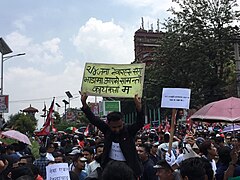Maitighar Mandala
माइतीघर मण्डला | |
 Aerial view of Maitighar Mandala | |
 | |
| 27°41′41″N 85°19′13″E / 27.694636774069195°N 85.32038141781345°E | |
| Location | Kathmandu |
|---|---|
| Type | Mandala |
| Material | Concrete |
| Completion date | 2001 |
The Maitighar Mandala (Nepali: माइतीघर मण्डला) is a symbolic monument located in the heart of Kathmandu, Nepal. It is an island at the intersection of roads from Thapathali, New Baneshwor, Bhadrakali and at the southeast corner of Singhadurbar, the administrative centre of Nepal. It forms an important landmark in the beautification of Kathmandu city and a master piece of art depicting Buddhist relics. It also marks the initiation mark stone of one of the major highways of Nepal, Araniko Highway, that links Nepal with China.
History
[edit]The Mandala was built in 2001 for the 11th SAARC summit in Nepal to showcase Nepali culture after clearing many multi-story buildings during the tenure of mayor Keshav Sthapit.[1]
Etymology
[edit]The name "Maitighar" literally means the "Parental Home' of the married women. Actually, there was a movie theater in today's Maitighar in the past, and a classic Nepal film, Maithighar (1966) was run for about a year. As there was a large poster depicting the name of the movie, people started calling the place as Maitighar.
The native name of the monument in Newar language is Fibwa Khya (फिब्वः ख्यः).[2]
Symbolism
[edit]The Mandala was designed to be in the form of a series of concentric circles. The outer-most has 32 vajras, the one next to it has 16 lotus petals and the inner has 32 garlands. Various colors on the Mandala (blue background, black, orange, and blue circles) symbolize man's characteristics - too much of one would result in an imbalanced temperament. Black stands for Krodh (anger), orange for Prem (love) and blue for Karuṇā (compassion). At the four corners of the mandala are symbols of the Ashtamangal.[3]
Significance
[edit]During the Nepalese Civil War, peace advocates gathered at the Mandala to show solidarity for peace and against violence.[3]
The government declaring the Mandala area a protest-free-site.[4][5]
Maintenance
[edit]By 2010, the Mandala artwork fell into disrepair. In 2011, the Agriculture Development Bank, Nepal pledged to devote resources to restore the Mandala.[6] The Mandala got a face-lift for the 18th SAARC summit[7] along with the overall enhancement of roads in Kathmandu.
Gallery
[edit]-
Huge flag of Nepal near the Mandala
-
Guthi Bill Protest at the Mandala
See also
[edit]References
[edit]- ^ "Maitighar Mandala to regain its lost charm". The Hindustan Times. 22 Jun 2011. Retrieved 3 July 2011.
- ^ "नाउँ फेर्दै, मौलिकता मास्दै :: आजको अन्नपूर्ण पोष्टबाट :: Shilapatra शिलापत्र - खबरको स्थायी ठेगाना". shilapatra.com (in Nepali). Retrieved 2022-10-28.
हालको माइतीघर मण्डलाको नाम फिब्वः ख्यः हो।
- ^ a b Phoboo, Abha Ali (Oct 2005). "Shanti mandala". WAVE Magazine. Retrieved 3 July 2011.
- ^ "'Maitighar Mandala will be protest free zone'". Retrieved 2018-09-13.
- ^ "SC stay on ban on protest at Maitighar to continue - The Himalayan Times". The Himalayan Times. 2018-07-14. Retrieved 2018-09-13.
- ^ "maitighar-decked-up-for-saarc".
- ^ "Maitighar decked up for Saarc". Kathmandu Post.


